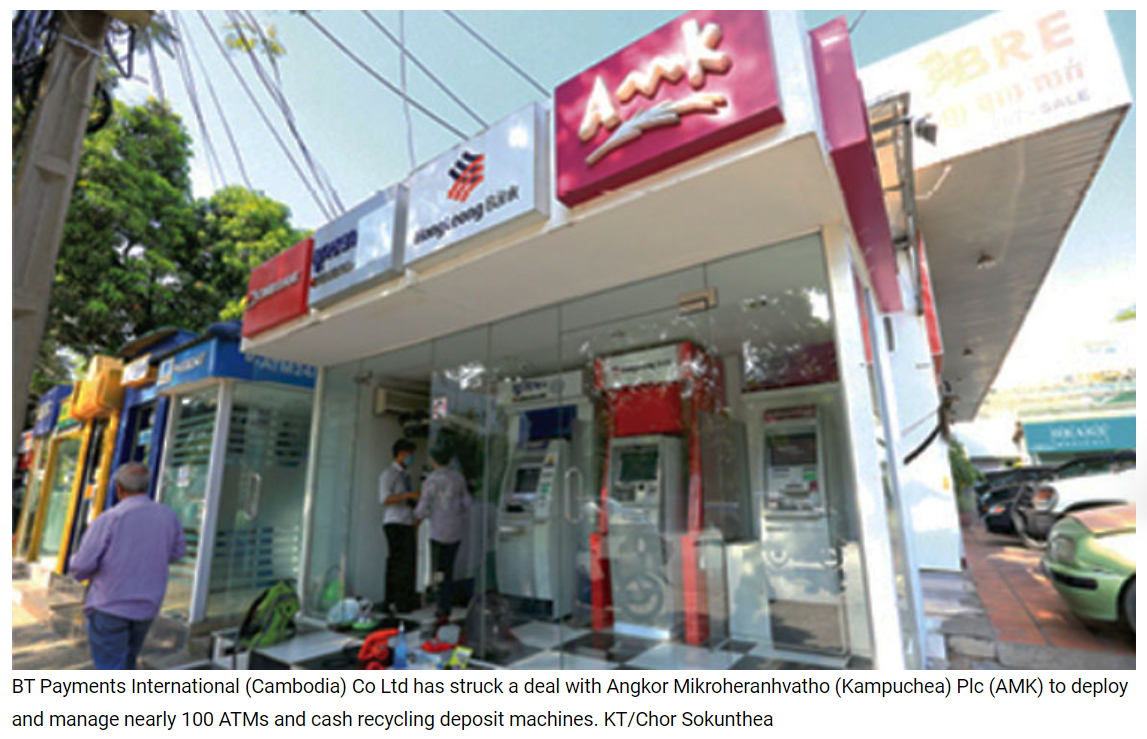ATM pioneer is keen to revolutionise machines in Cambodia
The man who brought automated teller machines (ATMs) to Cambodia is re-entering the space with a new venture that not only aims to improve automation, but also to revolutionise the revenue model.
While experts have said that fintech and contactless payments have increased during the pandemic, cash in circulation actually increased by 9.5 percent last year in Singapore, according to the Monetary Authority of Singapore.
David Yip, co-founder of BT Payments International (Cambodia) Co Ltd (BPI), first introduced ATMs to Cambodia in 2005 when he worked for Wincor Nixdorf. During that period, he forged partnerships with ACLEDA Bank, Foreign Trade Bank of Cambodia, UCB and Vattanac Bank, among others.
“ATMs are costly to manage and hard to update. Cambodia has one of the most forward-looking central banks in Southeast Asia and the young population is just far more eager to take advantage of new services and try things,” said Yip.
He believes that the pandemic has been an inflection point for the industry and the banking sector has good cause to change its relationship with the money-spitting machines. The pandemic has changed the public’s relationship with ATMs and people simply want the machines to do more than dispense cash.
Yip says clients want to use machines to pay their bills, open new accounts, have bank cards be issued instantly and use facial scanning technology or video calls to conduct banking services, eliminating the need for pass codes and cards altogether.
There are about 2,500 ATMs in Cambodia and almost all of them are owned and operated by banks. BPI is working to offload the burden of owning and operating ATMs.
Instead, the Cambodian subsidiary of an Australian company with the same name, will restock, update and repair machines for a nominal fee.
Yip declined to disclose the fee but made a point to stress that it greatly offsets the burden of owning depreciating assets in the form of ATMs. His firm would also be able to replace machines or provide software upgrades via the cloud to ensure that they do not become antiquated.
For example, software updates could add quick response codes to machines, or a technician could add fingerprint scanners to the devices. The onus of improving and delivering better services would be equally on BPI and not just the banks alone.
“Strategically, it is very important for banks too. When a machine breaks down or if someone else introduces a new feature, the consumer views it as a reflection on the bank itself,” said Yip.
He added that he is in advanced negotiations with several microfinance institutions and banks and additional agreements would be made “very soon”.
The company has already struck a deal with Angkor Mikroheranhvatho (Kampuchea) Plc (AMK) to deploy and manage nearly 100 ATMs and cash recycling deposit machines.
“AMK is working with BPI to offer more value-added services in the market as part of our growth strategy and we believe this partnership with them as a technology partner can accelerate our plans and also provide us with a wider choice of technology innovation,” said Kea Borann, chief executive officer of AMK.
Yip said that it was just a matter of time before more banks adopt the model. In the meantime, BPI is focusing on high cash-flow businesses for its cash management services.
These services would see businesses such as gas stations deposit money directly into a cash deposit machine instead of a safe or locker. As a result, the funds will instantly appear in companies’ bank accounts.
“Cambodia is definitely still a cash-first society and we are going to see the roll-out of more machines in the years to come. In the meantime, when financial institutions transform to become more digital, the focus should be on delivering the best and most innovative customer experiences possible,” said Yip.
Source: https://www.khmertimeskh.com/50890281/atm-pioneer-is-keen-to-revolutionise-machines/


 Thailand
Thailand




